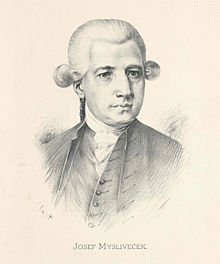Motezuma (Mysliveček)

Motezuma is an opera in three acts by Josef Mysliveček set to a libretto by Vittorio Amedeo Cigna-Santi that is based on Spanish histories and chronicles about the Aztec ruler Moctezuma II. This opera (and all the rest of Mysliveček's operas) belong to the serious type in Italian language referred to as opera seria.
Performance history
[edit]The opera was first performed at the Teatro della Pergola in Florence on 23 January 1771. It was the second of the composer's three operas produced in Florence, in this case at a time of intense activity as a composer in the city. The chronological setting of the opera in the early sixteenth century was unusually late for its day, when serious operas in Italian were typically set in ancient times, and rarely in a time period later than the European Middle Ages. The libretto was first set for a lavish production in 1765 at the Teatro Regio in Turin with music by Gian Francesco de Majo. It is unlikely that the Florence production was equally sumptuous, and the cast was not particularly distinguished, although it was an interesting one for the dominance of male singers (it was generally only in Rome, where women were forbidden to appear on stage, that casts would feature so many male singers). Motezuma was the first of the composer's operas to be revived in modern times (for a performance in Prague in 1931). It was likely the exotic setting and the availability of a score of the opera in Vienna, that made it so attractive for revival at that time, perhaps as a response to a trend in German-speaking lands in the 1920s to revive works by pre-Romantic German composers such as George Frideric Handel. A revival in Znojmo took place in summer 2011.
Roles
[edit]| Role | Voice type | Premiere cast, 23 January 1771, Teatro della Pergola, Florence |
|---|---|---|
| Motezuma | soprano castrato | Carlo Nicolini |
| Guacozinga | soprano | Giovanna Carmignani |
| Ferdinando Cortes | tenor | Salvator Casetti |
| Teutile | soprano castrato | Marcello Pompili |
| Lisinga | soprano | Maddalena Mori della Casa |
| Pilpatoe | soprano castrato | Francesco Papi |
Vocal set pieces
[edit]Act I, scene 2 - Accompanied recitative for Motezuma, "Dove son? Che m'avvene?," with cavatina, "Ah, numi tiranni"
Act I, scene 2 - Aria of Lisinga, "So che non cangio stato"
Act I, scene 3 - Aria of Motezuma, "Cara fiamma del mio seno"
Act I, scene 4 - Aria of Guacozinga, "Nel mar di tanti affanni"
Act I, scene 6 - Aria of Cortes, "Rammenta al tuo sovrano"
Act I, scene 9 - Aria of Teutile, "Di fieri sdegni armato"
Act I, scene 11 - Aria of Guacozinga, "Ah no, arresta, o caro"
Act I, scene 12 - Aria of Motezuma, "A morir se mi condanna"
Act II, scene 2 - Aria of Cortes, "A mio danno in vano"
Act II, scene 4 - Aria of Lisinga, "Mi scordo lo scempio"
Act II, scene 5 - Aria of Pilpatoe, "Pensa che dell'impero"
Act II, scene 7 - Aria of Motezuma, "Cara che torna in pace"
Act II, scene 8 - Aria of Guacozinga, "Frena l'insano orgoglio"
Act II, scene 10 - Aria of Teutile, "Scherza il nocchier"
Act II, scene 13 - Aria of Cortes, "Perche ogn'ombra ti parta dal core"
Act II, scene 14 - Duet for Guacozinga and Motezuma, "Ah, se mi sei fedele"
Act III, scene 3 - Aria of Teutile, "Non lasci le sponde"
Act III, scene 4 - Aria of Lisinga, "M'ingombra d'orrore"
Act III, scene 9 - Aria of Cortes, "Basta il mio brando solo"
Act III, scene 10 - Aria of Motezuma, "Vorrebbe il core sperar la calma"
Act III, scene 11 - Accompanied recitative for Guacozinga, "Eccomi sola al fine"
Act III, scene 11 - Aria of Guacozinga, "Ombre dolenti"
Recordings
[edit]The only complete video recording was made in 2011 in Znojmo. The video is officially available in the full length and HD quality with the Czech subtitles for free: Josef Mysliveček - Motezuma - HD.
Motezuma's aria "Cara che torna in pace" is available in an anthology recorded by the Czech soprano Zdena Kloubová. The recording is Panton 81 1044-2231 (1992) with the Benda Chamber Orchestra, Miroslav Hrdlička, conductor.
The overture to Mysliveček's Motezuma is included in a collection of symphonies and overtures by the composer recorded by the L'Orfeo Barockorchester, Michi Gaigg, conductor, CPO 777-050 (2004).
References
[edit]- Freeman, Daniel E. Josef Mysliveček, "Il Boemo." Sterling Heights, Mich.: Harmonie Park Press, 2009.
